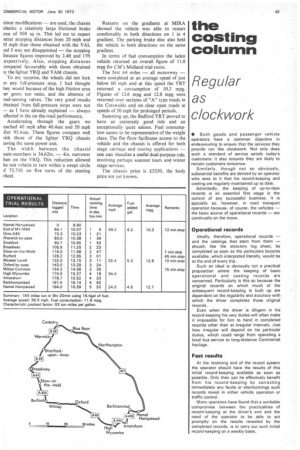the costing column Regular as clockwork
Page 45

If you've noticed an error in this article please click here to report it so we can fix it.
• Both goods and passenger vehicle operators, have a common objective in endeavouring to ensure that the services they provide run like clockwork. Not only does such a standard of service satisfy today's customers: it also ensures they are likely to remain customers tomorrow.
Similarly, though not so obviously, substantial benefits are derived by an operator who sees to it that his record-keeping and costing are regularly maintained up to date.
Admittedly, the keeping of up-to-date records is an essential first stage in the control of any successful business. It is specially so, however, in road transport operation because, of course, the vehicles the basic source of operational records are continually on the move.
Operational records
Ideally, therefore, operational records and the coatings that stem from them should, like the statutory log sheet, be completed as soon as the particulars become available, which interpreted literally, would be at the end of every trip.
Such an ideal is obviously not a practical proposition where the keeping of basic operational and costing records are concerned. Particularly is this so because the original records on which much of the subsequent record-keeping is built up are dependent on the regularity and accuracy with which the driver completes those original records.
Even when the driver is diligent in his record-keeping his very duties will often make it impossible for him to hand in completed records other than at irregular intervals. Just how irregular will depend on his particular duties, which could range from operating a local bus service to long-distance Continental haulage.
Fast results
At the receiving end of the record system the operator should have the results of this initial record-keeping available as soon as possible. Only then can he effectively benefit from his record-keeping by correcting immediately any faults or shortcomings such records reveal in either vehicle operation or traffic control.
Many operators have found that a workable compromise between the practicalities of record-keeping at the driver's end and the need of the operator to be able to act promptly on the results revealed by the completed records, is to carry out such initial record-keeping on a weekly basis.




























































































